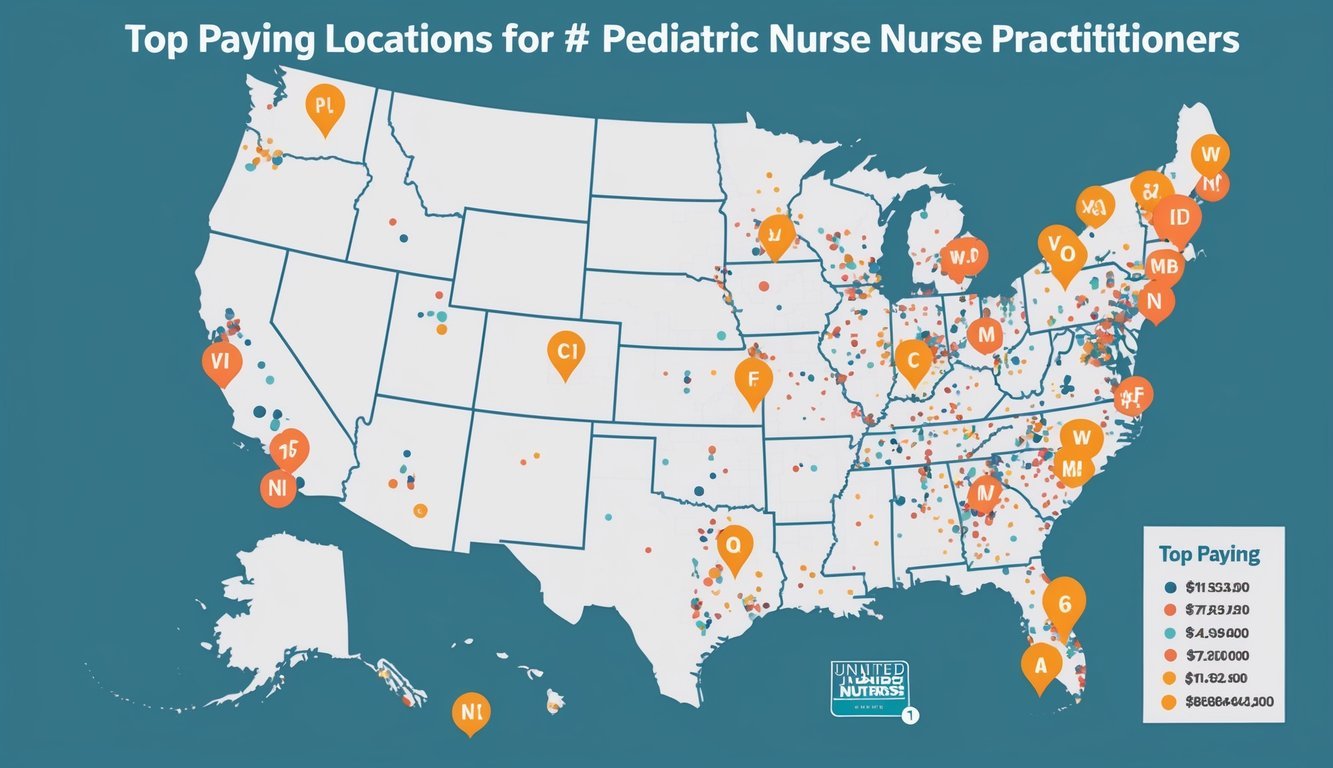As a pediatric nurse practitioner, you play a vital role in caring for children and supporting their families.
In the United States, pediatric nurse practitioners earn a median annual salary of about $129,480, making this a rewarding career choice for those passionate about child health.
Understanding the salary landscape can help you make informed decisions about your career path, whether you are just starting or looking to advance.
In addition to a competitive salary, many pediatric nurse practitioners also receive various forms of compensation, including benefits and bonuses.
The salary can vary significantly based on location, experience, and specific job responsibilities.
This variation means that some regions offer higher pay, making it essential to research the best opportunities available.
With a growing demand for healthcare services, the outlook for pediatric nurse practitioners remains strong.
As healthcare continues to prioritize children’s needs, you can expect a range of opportunities and competitive salaries in this fulfilling field.
Key Takeaways
- Pediatric nurse practitioners have a median salary of around $129,480.
- Salary can differ based on experience and location.
- The demand for pediatric nurse practitioners is on the rise.
Overview of Pediatric Nurse Practitioners
Pediatric nurse practitioners (PNPs) play a vital role in children’s healthcare.
They have advanced training that allows them to provide a wide range of services.
Understanding their responsibilities and the educational path to becoming a PNP is crucial.
Role and Scope of Practice
Pediatric nurse practitioners focus on the health needs of infants, children, and adolescents.
They conduct physical exams, diagnose illnesses, and manage treatment plans.
PNPs can perform many tasks traditionally done by doctors, such as prescribing medication and ordering diagnostic tests.
Their roles often include:
- Health Assessments: Conducting regular check-ups and developmental screenings.
- Patient Education: Teaching families about health, nutrition, and preventive care.
- Collaboration: Working alongside other healthcare professionals to provide comprehensive care.
PNPs can work in various settings, including hospitals, clinics, and schools.
They are advanced practice registered nurses (APRNs) and must have a master’s or doctoral degree in nursing with a pediatric focus.
Pediatric Nurse Practitioner Programs
To become a pediatric nurse practitioner, you need a specialized education.
Many programs offer both a master’s and a doctoral degree in nursing with a pediatric focus.
These programs include clinical training, where you gain hands-on experience.
Key components of these programs often include:
- Core Nursing Courses: Understanding advanced nursing principles.
- Pediatrics-Specific Courses: Learning about child development and common pediatric conditions.
- Clinical Practicum: Completing supervised clinical hours in pediatric settings.
Accredited programs help prepare you for certification exams.
Certification is necessary to practice as a PNP.
For more details on programs, you can explore options at resources like Nurse.org.
Pediatric Nurse Practitioner Salaries
Pediatric nurse practitioners (PNPs) earn competitive salaries that vary based on several factors including location, experience, and specialty.
Understanding these elements will help you gain clearer insight into what to expect in this career.
Factors Affecting Salaries
Several factors impact the salary of pediatric nurse practitioners.
Experience level is crucial; entry-level PNPs typically earn lower salaries compared to those with years of experience.
Advanced qualifications, such as board certifications or specialized training in primary care, can also lead to higher compensations.
Geography plays a significant role too.
States with a higher cost of living often offer higher salaries.
For example, PNPs in California tend to earn more than those in rural states.
Additionally, the type of healthcare setting influences pay.
Those working in hospitals usually receive higher salaries compared to those in outpatient clinics.
Average Salary Comparison by State
Here’s a comparison of average salaries for pediatric nurse practitioners in several states:
| State | Average Salary |
|---|---|
| California | $138,555 |
| Texas | $134,132 |
| New York | $140,000 |
| Florida | $128,000 |
| Illinois | $130,500 |
According to available data, the average base salary for pediatric nurse practitioners in the U.S. is around $134,132 annually.
The salary range can vary widely.
Some PNPs may earn as low as $91,679, while others in high-demand areas may make up to $196,243.
For a detailed examination of salaries by state, you can check resources like Nursing Process for specific figures.
This information will help you understand the financial landscape as you pursue a career as a pediatric nurse practitioner.
Salary Breakdown and Additional Compensation

When considering a career as a pediatric nurse practitioner, it’s essential to look beyond the base salary.
Understanding benefits, overtime, bonuses, and overall compensation can provide a clearer picture of your potential earnings.
Benefits and Perks
Pediatric nurse practitioners often receive a variety of benefits that enhance their total compensation package.
Common benefits include health insurance, retirement plans, and paid time off.
You might also have access to continuing education allowances, which allow you to further your training.
These perks can significantly affect your overall income and job satisfaction.
Here’s a brief overview of typical benefits:
| Benefit | Description |
|---|---|
| Health Insurance | Medical, dental, and vision coverage |
| Retirement Plans | 401(k) or pension contributions |
| Paid Time Off | Vacation and sick leave |
| Continuing Education | Funds for conferences and courses |
These benefits not only support your health and financial future but also contribute to your work-life balance.
Overtime and Bonuses
Working as a pediatric nurse practitioner sometimes involves overtime.
Many healthcare facilities compensate for this extra time, offering higher hourly rates for any hours worked beyond the standard schedule.
Bonuses may also factor into your compensation.
Some practices provide performance incentives, which can add a significant amount to your annual earnings.
You could see bonuses based on:
- Performance metrics
- Patient satisfaction
- Length of service
By taking advantage of overtime and bonuses, you can boost your overall salary.
Understanding these aspects is crucial for planning your financial future as a pediatric nurse practitioner.
Career Outlook for Pediatric Nurse Practitioners
The career outlook for pediatric nurse practitioners (PNPs) is strong, with a growing demand for qualified professionals in the field.
Opportunities are abundant, and salaries can vary based on experience and location.
Job Openings and Market Demand
Pediatric nurse practitioners are in high demand due to the increasing emphasis on pediatric healthcare.
The job openings for these professionals are projected to grow significantly over the next several years.
In states with full practice authority, PNPs can practice independently, driving up demand even further.
According to recent estimates, the job outlook for nurse practitioners, including PNPs, could grow by more than 41% by 2028 in regions like New York.
In addition, many pediatric practices are looking to expand their teams to provide better patient care.
This means there are numerous opportunities available for those entering the field.
Career Progression and Salaries by Experience
As a pediatric nurse practitioner, your earning potential increases with experience.
Entry-level PNPs can expect salaries around $100,656 per year.
However, with more experience, this number can rise significantly.
Here is a breakdown of pediatric nurse practitioner salaries by years of experience:
| Years of Experience | Average Salary |
|---|---|
| 0-1 years | $100,656 |
| 1-3 years | $120,000 |
| 3-5 years | $130,000 |
| 5+ years | $140,000+ |
In general, PNPs enjoy high job satisfaction due to their role in improving children’s health and making a positive impact on families.
As you progress in your career, your skills and expertise will become more valuable, directly influencing your salary potential.
Top Paying Locations for Pediatric NPs

When considering where to work, location plays a significant role in salary potential for pediatric nurse practitioners.
Some cities offer much higher salaries that can greatly affect your overall earnings and lifestyle.
Salaries by City
Here are some of the highest-paying cities for pediatric NPs along with their average salaries:
| City | Average Salary |
|---|---|
| New York, NY | $138,555 |
| Dallas, TX | $124,000 |
| Los Angeles, CA | $132,000 |
| Brooklyn, NY | $136,000 |
| Las Vegas, NV | $112,000 |
| Phoenix, AZ | $123,000 |
| Houston, TX | $125,000 |
In New York, NY, you can expect attractive compensation, making it one of the top areas for pediatric NPs.
Dallas, TX follows closely, offering competitive salaries in a growing market.
Los Angeles, CA also provides high salaries, though the cost of living is a significant factor to consider.
Meanwhile, Houston, TX and Phoenix, AZ present solid options with promising salary ranges.
Frequently Asked Questions
Understanding the salary of pediatric nurse practitioners involves various factors.
These can include geographic location, experience, and educational background.
Here are some key questions that can help clarify important aspects of this profession.
What factors influence the salary of pediatric nurse practitioners in different states?
Several factors influence salaries, including cost of living, demand for healthcare services, and state funding for healthcare.
States with higher living costs often offer higher salaries to match.
Additionally, urban areas generally have more opportunities and higher salaries compared to rural regions.
How does experience level affect pediatric nurse practitioner salaries?
Experience plays a significant role in determining salary levels.
Entry-level pediatric nurse practitioners may start at lower salaries.
As you gain experience and take on more responsibilities, your earning potential increases.
Senior-level professionals or those in specialized roles can earn considerably more.
What is the salary range for pediatric nurse practitioners working on an hourly basis?
Hourly wages for pediatric nurse practitioners can vary widely.
Based on recent data, the average hourly rate for this role is around $54.51 for PNP-PCs and $49.59 for PNP-ACs.
In general, hourly wages can range from approximately $47 to over $100, depending on experience and location.
What are the educational and licensure requirements influencing pediatric nurse practitioner compensation?
To work as a pediatric nurse practitioner, you must complete a master’s or doctoral program in nursing.
You also need to pass the necessary licensure exams.
These requirements can affect your starting salary, as higher qualifications may lead to better compensation.
What is the average salary for pediatric nurse practitioners in California?
In California, the average salary for pediatric nurse practitioners is notably higher than in many other states.
Reports indicate that it can be around $130,000 annually.
This figure reflects the high demand for healthcare workers in the state, as well as its high cost of living.
Which states offer the highest compensation for pediatric nurse practitioners?
States like California, New York, and Texas typically offer the highest salaries for pediatric nurse practitioners.
In California, the average annual salary can exceed $130,000.
These states provide more opportunities and higher salaries, but their cost of living is also usually higher.

